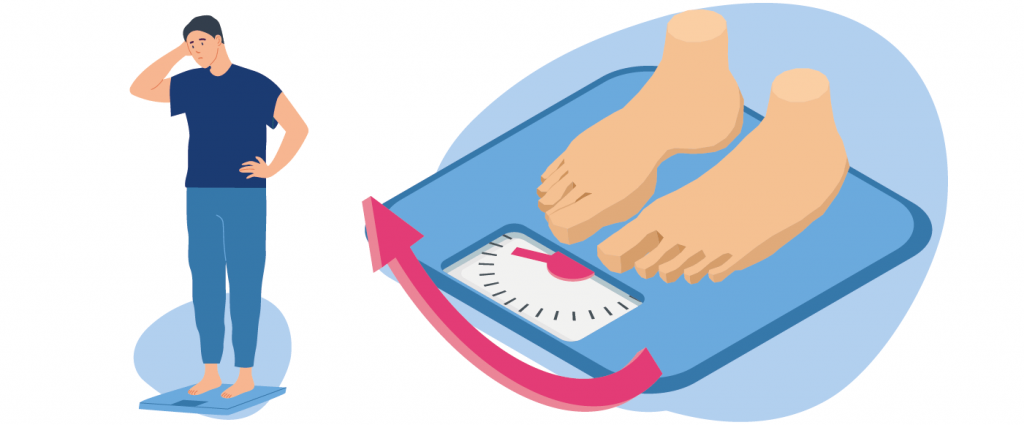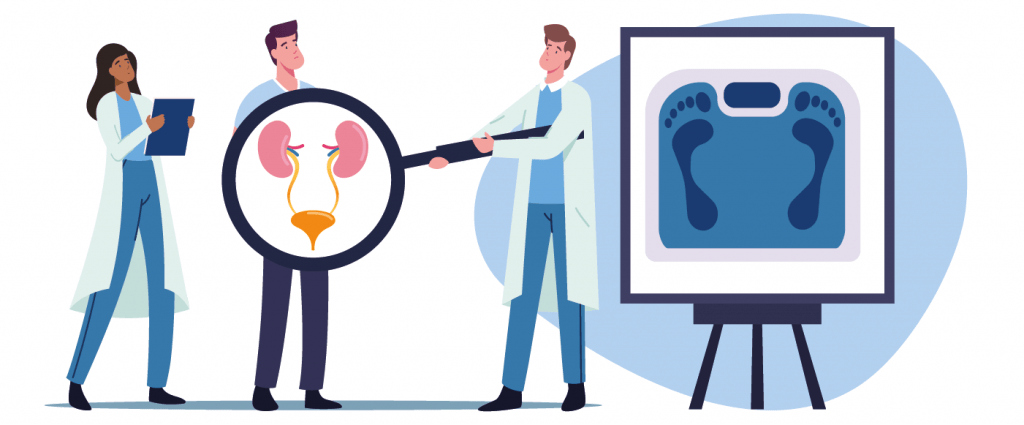What is the relationship between weight gain and incontinence?
Many people worry about weight gain, particularly after the holiday season or before a big event, such as a wedding. But is there a relationship between weight gain and incontinence? Can it cause incontinence or impact existing urinary conditions? Read on to discover the relationship between weight gain and your health, particularly incontinence and bladder health.
What causes weight gain?
Weight gain occurs when you’re consuming more calories than you’re using through your daily activity.1 Weight gain itself is not always an issue. However, unexplained weight gain may indicate an underlying cause, such as stress, side effects of medication, lack of sleep, PCOS (a condition where extra harmless follicles grow on your ovaries) or an underactive thyroid.2

If you have any concerns about your weight gain, iD would recommend you talk to a healthcare provider for advice.
What impact does weight gain have on your health?
With 53% of adults in the EU considered overweight or obese3, it’s easy to see why weight gain is becoming a growing worry. Obesity, believed to 17% of adults in the EU4, is defined as having a BMI of 30 or over, whereas a healthy weight is considered a BMI of 18.5 to 24.9.5 If you want to check where you fall within these guidelines, you can use a BMI calculator.
In terms of the effect on your health, being obese can lead to many complications, including:
- high blood pressure
- high LDL cholesterol
- Type 2 diabetes
- heart disease and stroke
- osteoarthritis (where the cartilage and bone in a joint break down)
- breathing problems, such as sleep apnoea
- various forms of cancer
- mental illnesses, including depression and anxiety
- pain and physical impairment6
But with all this in mind, what is the relationship between weight gain and bladder issues, particularly urinary incontinence(UI)?

Does weight gain cause incontinence?
A study performed by Australian researchers on women from eight countries: Australia, France, the US, Denmark, England, Scotland, Wales and the Netherlands, showed that there is a correlation between weight gain and incontinence.7 It was found that obese women were twice as likely to leak urine, and overweight women were 35% more likely to be incontinent.8 This was the case for various types of incontinence, including stress incontinence and urge incontinence.9 While not conclusive proof of a causal relationship, this would seem to indicate that weight gain may have a role in causing incontinence.

What is the relationship between weight gain and existing incontinence?
In addition to potentially causing incontinence, weight gain may impact existing incontinence. Carrying extra weight may put extra pressure on the bladder, urethra and pelvic floor muscles, making symptoms of UI worse.10
Therefore, weight gain is one of many lifestyle factors, including caffeine consumption, smokingand alcohol consumptionthat may worsen incontinence symptoms.11 You may be able to manage this condition yourself with a few non-surgical treatments, such as a healthy dietand getting more exercise. And, in the meantime, you can feel confident in your management of leakages by using our range of comfortable, discreet and dermatologist-approved continence products.

Sources
1 “Hidden causes of weight gain”, NHS, 20 August 2018, Source: https://www.nhs.uk/live-well/healthy-weight/hidden-causes-of-weight-gain/
2 “9 medical reasons for putting on weight”, NHS, 25 February 2020, Source: https://www.nhs.uk/live-well/healthy-weight/nine-medical-reasons-for-putting-on-weight/
3 “Over half of adults in the EU are overweight”, eurostat, 27 July 2021, Source: https://ec.europa.eu/eurostat/web/products-eurostat-news/-/ddn-20210721-2
4 Ibid
5 “Obesity”, NHS, 16 May 2019, Source: https://www.nhs.uk/conditions/obesity/
6 “The Health Effects of Overweight and Obesity”, CDC, 17 September 2020, Source: https://www.cdc.gov/healthyweight/effects/index.html
7 “Excess pounds can lead to a leaky bladder”, Linda Carroll, 20 September 2018, Source: https://www.reuters.com/article/us-health-obesity-incontinence-idUSKCN1M033Y
8 Ibid
9 Ibid
10 “Urinary incontinence: 5 ways you may be making your symptoms worse”, King Edward VII’s Hospital, n.d., Source: https://www.kingedwardvii.co.uk/health-hub/urinary-incontinence-5-ways-you-may-be-making-your-symptoms-worse
11 Ibid
